He Flew Commercial Planes In Afghanistan. Now He Has To Start Over.
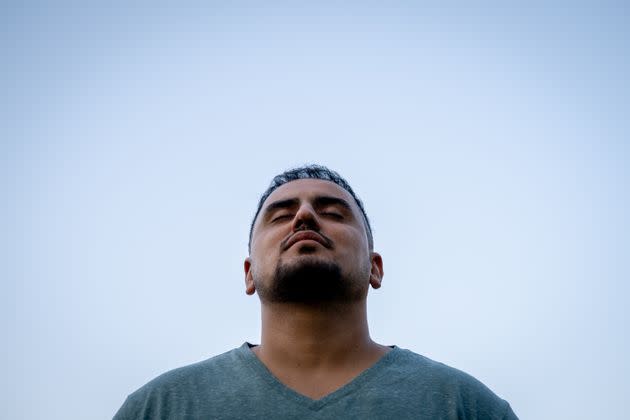
Hafiz Akbarzada, an Afghan refugee and former pilot, poses in his Colorado neighborhood on Sept. 12, 2022. Akbarzada, who dreams of flying once again, is soon starting a customer service job with United Airlines and plans to begin training to get back in the air. (Photo: Eli Imadali for HuffPost)
Abdul Hafiz Akbarzada packed to leave Kabul the day the U.S. completely withdrew its forces on Aug. 30, 2021. He knew this was his last takeoff from the country he had always called home.
He wore his navy blue, gold-striped pilot’s uniform and flight bag. He boarded the plane, but this time, he sat in the passenger seat.
When Kabul had fallen to the Taliban two weeks earlier, many pilots stayed underground and refused to take flights. But Akbarzada, 32, was one of the few commercial pilots who continued to operate despite the chaos that plagued the airport.
At a time when tens of thousands of people were rushing to the airport to flee the country for fear of the Taliban’s retaliation, he felt his knowledge and experience were needed. During the frenzied evacuation, commercial airlines provided planes to airlift thousands of people to countries including UAE, Qatar, Albania and Uganda. Akbarzada flew four flights to Qatar and UAE during the last two weeks of August and airlifted hundreds of Afghans.
“There was chaos everywhere,” Akbarzada recalled. He was scheduled to fly a plane to Ukraine the day Kabul fell. To get to the airport, he had to walk for an hour and a half because the roads to the airport were packed with cars. When he arrived, he found that nothing was the same anymore.
“There was no authority, no order, no nothing,” he said. “The airport and the roads leading to it were clogged with people who were trying to flee. The civilian side of the airport was left uncontrolled, and everyone was rushing to board any aircraft on the ramp. There were shootings and screams everywhere,” he said.
He never previously considered leaving the country, though he had plenty of chances.
But his commitment to staying had wavered before one of his last commercial flights when Taliban members stopped Akbarzada and his captain as they were walking to the terminal for an evacuation flight to Qatar. They both wore their usual navy blue pilot suits with golden stripes, white shirts and ties, carrying their iPads, headphones, licenses and flight documents in their bags.
When the Taliban members checked their bags, Akbarzada tried to explain that they were only civilian pilots who had nothing to do with the military or former government. But one of the Taliban inspectors pointed a gun at him and yelled, “Shut up, Infidel, I will shoot you!”
Akbarzada never thought the Taliban would threaten a civilian pilot. He couldn’t help but think about his family, about his pregnant wife and his unborn child, about his younger siblings and their futures. “What would happen to them if I am threatened and not respected as a pilot at the airport?” he asked himself.
So he left. Akbarzada is now one of the thousands of Afghans in the U.S. who fled their country when Kabul fell to the Taliban last summer in order to avoid revenge killing and persecution. Many more are expecting to relocate this year.
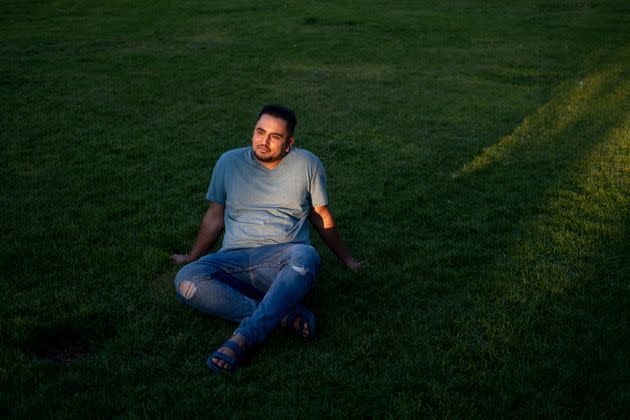
Akbarzada flew four evacuation flights to Qatar and UAE prior to the U.S. withdrawal from Afghanistan. (Photo: Eli Imadali for HuffPost)
A Dream Cut Short
Akbarzada started out in 2011 as a check-in agent for Kam Air, the largest private airline in Afghanistan. One day, when a captain and his cabin crew were passing through the terminal hallway, he noticed everyone standing with their right hand on their chest as a sign of respect, and that was the moment he knew he wanted to be a pilot. His love of flying only grew after he joined the cabin crew.
He decided to begin saving up to move abroad and train as a pilot. After talking it over with his boss and securing some funding, he eventually made it to the United States to complete his professional aviation education. In 2017, he completed a rigorous two-year training program in Daytona Beach, Florida, and earned his commercial pilot license from the Federal Aviation Administration. He returned home as a licensed commercial pilot and made his first flight as a trainee pilot for Kam Air.
“It was a dream come true,” Akbarzada said. “I was very excited. It’s the most amazing feeling especially when you take off and land for the first time and you are sitting in the cockpit controlling the aircraft.”
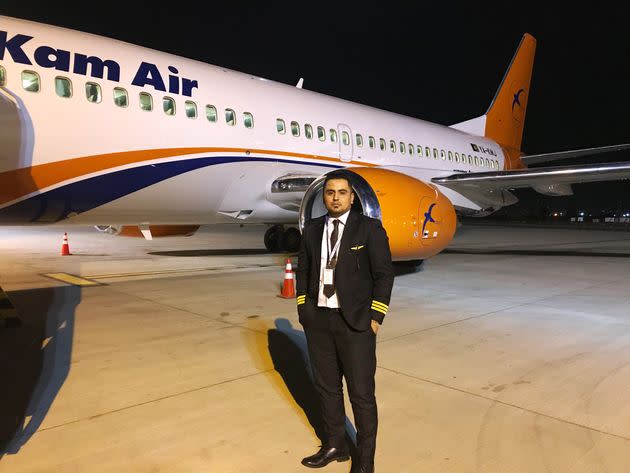
Hafiz Akbarzada as a pilot in Afghanistan, where he worked for Kam Air. (Photo: Courtesy Hafiz Akbarzada)
With more than 3,000 hours of flight time as a first officer pilot, Akbarzada hoped to one day sit on the left side of the cockpit as a captain. He wanted to buy a house and raise his child in Kabul. That dream died when he was forced to flee.
“I had mixed emotions,” Hafiz recalled of the moment his plane took off from Kabul that day. “You’re sad because you left everything you’d built, glad because your family’s safe, anxious because you don’t know what the future holds for you.”
After spending nine months in the facility in Abu Dhabi known as the Emirates Humanitarian City, which has housed hundreds of displaced Afghans since last year, Hafiz and his family made it to the U.S. in July of this year and settled in Denver. Thousands of Afghans are still living in temporary housing in Abu Dhabi, awaiting resettlement in the United States or other countries.
Starting Over Again
Akbarzada’s displacement cost him his sense of normalcy and peace. He was a successful pilot, about to become a father for the first time, with a loving wife and family and a bright future ahead. Having his son in a temporary shelter with no permanent country to call home was the last thing he ever expected.
“There were times I thought maybe I should have stayed and never left,” he said. “But as I looked at my son again, I knew I had made the right decision.”
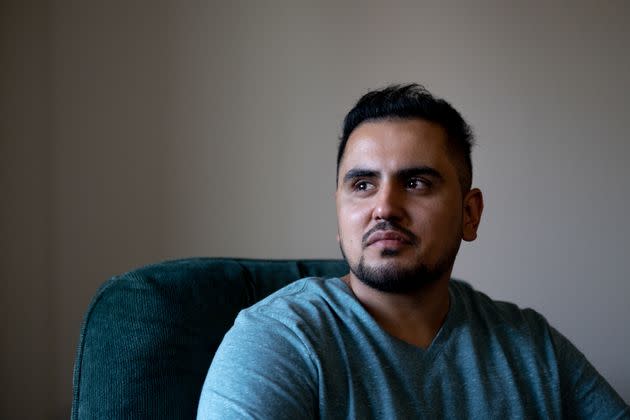
Akbarzada said his position as a check-in agent for Kam Air "taught me to be patient and work towards my goal slowly and consistently." (Photo: Eli Imadali for HuffPost)
Akbarzada’s arrival in the United States, however, has given him renewed hope for a fresh start. Since he is a certified commercial pilot, he hopes to fly again in the U.S. He speaks fluent English, a skill many Afghans lack and that prevents them from getting better jobs in America. Additionally, U.S. airlines are experiencing a pilot shortage, making Akbarzada’s thousands of flying hours highly desirable.
But for Akbarzada to get back to his career, he will need to spend thousands of dollars and weeks obtaining a separate license called an ATPL – Airline Transport Pilot License.
Akbarzada recently began working as a customer service agent for United Airlines at Denver International Airport — starting in an entry-level position at an airline once again. “It reminds me of my early days as a check-in staff at Kabul airport,” he said. “I think those days taught me to be patient and work towards my goal slowly and consistently.”
He hopes the job will help pay his bills and fund the costs associated with the ATPL.
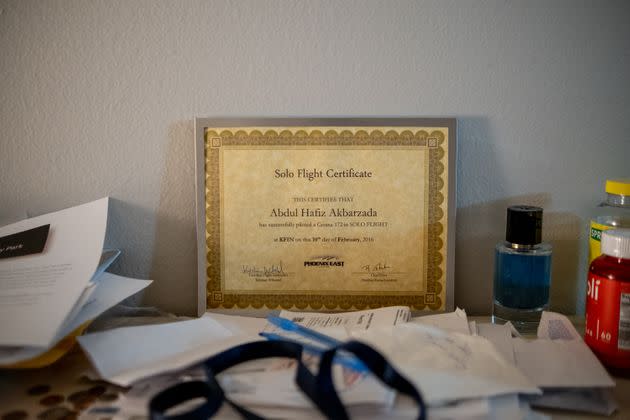
A flight certificate sits framed on Hafiz Akbarzada and his wife’s dresser in their new Colorado apartment on Sept. 12, 2022. (Photo: Eli Imadali for HuffPost)
Like Akbarzada, thousands of highly skilled recent Afghan arrivals in the U.S. have been forced to take low-paying occupations to make ends meet. Many of these individuals used to work in management, information technology, engineering, medicine or aviation.
Akbarzada’s temporary immigration status could also hinder his career as a pilot. Without permanent residency, he can’t fly overseas. It could take years for Afghan arrivals to get their green cards unless lawmakers enact the Afghan Adjustment Act introduced last month. The proposal would make it possible for Afghans to get permanent status outside of the currently backlogged asylum system.
But that hasn’t discouraged Akbarzada.
“I’ll never give up flying,” he said. “My goal is to get back in the air and one day become a captain in the U.S.”
This article originally appeared on HuffPost and has been updated.
